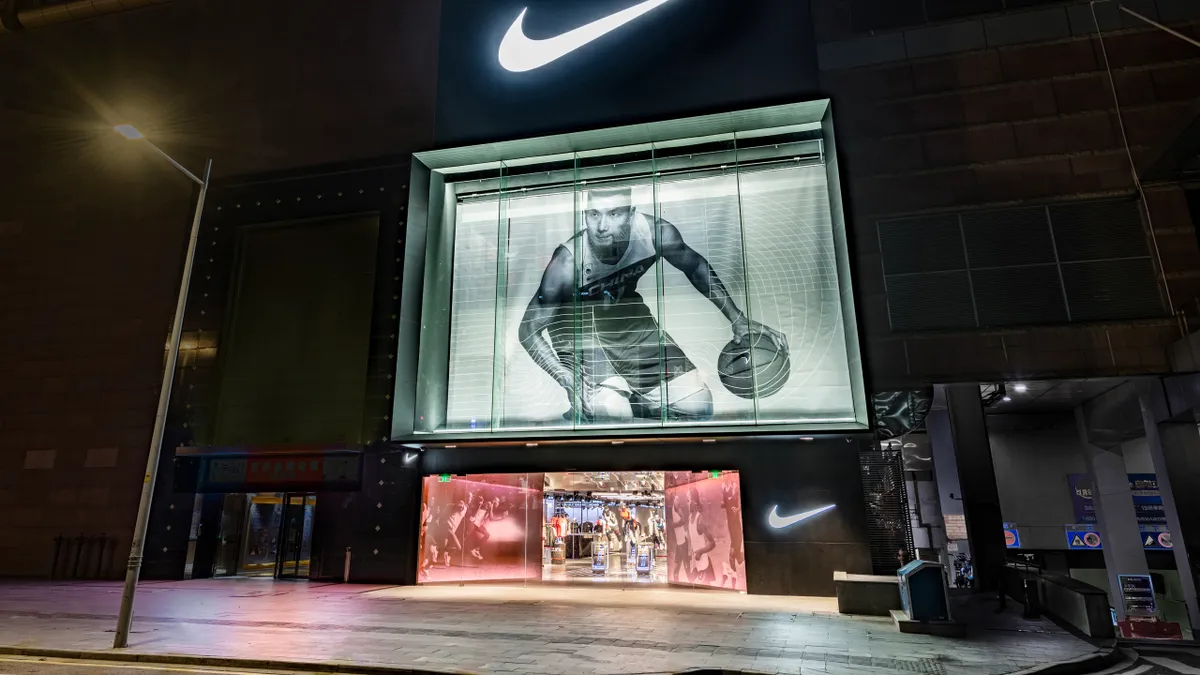Dive Brief:
- Nike executives threw a spotlight on the brand's February acquisition of data integration platform Datalogue on a call discussing third-quarter results with analysts. They positioned the deal as one that will speed up and scale Nike's tech capabilities, while trying to balance those with traditional creative functions.
- Chief executive John Donahoe emphasized that data helps Nike to drive efficiency and productivity, qualities that are increasingly important as more business shifts to direct-to-consumer (DTC) and digital channels. Nike generated $1 billion in digital revenue in North America for the first time in Q3.
- Datalogue marks Nike's fourth acquisition in the data and analytics space in recent years. Marketers are broadly getting more acquisitive in such areas as they contend with the death of third-party cookies and changes to Apple's Identifier for Advertisers, among other disruptions.
Dive Insight:
Nike acquired Datalogue in February as part of a larger organizational realignment of its business to focus more on digital and DTC strategy. Founded in 2016, Datalogue uses machine learning to prepare and integrate data from a variety of sources across an enterprise. For Nike, that means drawing on owned channels like its app ecosystem — a major engagement driver with consumers during the pandemic — as well as supply chain and enterprise operations.
"We expect Datalogue to amplify our speed in analyzing consumer data and inform product, marketing and service recommendations, ultimately increasing member buying frequency, basket size and member retention rates," Nike Chief Financial Officer Matthew Friend said on the call with investors, a transcript of which was provided by Seeking Alpha.
While the acquisition is fresh, Nike leadership indicated that results are already taking shape. CEO Donahoe called out more improved and personalized search results and product recommendations for users. The executive frequently returned to the importance of quickly scaling data-driven expertise to stay competitive in a retail category that is racing to gird itself for a DTC and data-driven future.
At the same time, Nike is trying to balance those demands with the marketing functions that have turned its brand into a purpose-driven leader. Technology can unlock more targeted communications and personalized recommendations, Donahoe said, but Nike is making an effort to align its data teams with creative ones.
"The science of what we are doing, it's been done, it's doable. But the thing that makes this company remarkable is the art," Donahoe said on the earnings call. "It's the creativity of our brand teams and the storytelling they do and so data doesn't displace art ... [but] help enhance it and supplement it."
Datalogue builds on other tech-oriented purchases by Nike, including its acquisition of predictive analytics company Celect two years ago. Nike last summer introduced a Consumer Direct Acceleration that sees it prioritize digital investments and creating a "marketplace of the future."
Other brand marketers are following a similar playbook as they look to fortify their first-party data expertise ahead of the death of cookies and other disruptions to the ad-targeting landscape. Yum Brands, the owner of KFC, Taco Bell and Pizza Hut, in March acquired the artificial intelligence business of performance marketing firm Kvantum in a bid to "scale and fast-track" its data strategy. Yum will pair Kvantum with its internal consultancy Collider Labs, which is staffed with anthropologists and sociologists who attempt to extract "culture-based" consumer insights for the restaurant giant.















